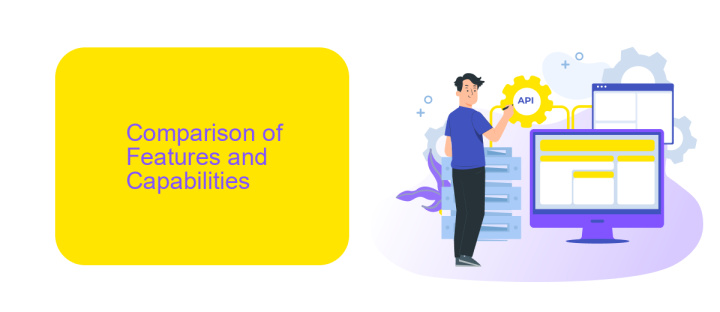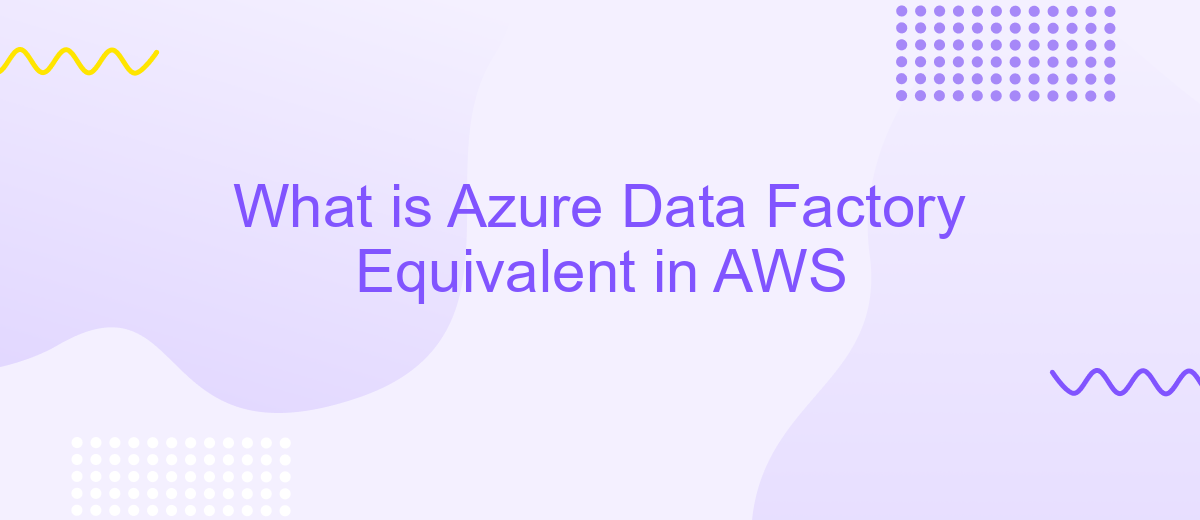What is Azure Data Factory Equivalent in AWS
Azure Data Factory is a powerful cloud-based data integration service offered by Microsoft Azure, enabling seamless data movement and transformation. For those exploring similar capabilities within Amazon Web Services (AWS), it's essential to identify the equivalent services. This article delves into AWS offerings that match Azure Data Factory's functionality, helping organizations make informed decisions for their cloud data integration needs.
Introduction
As businesses increasingly move towards cloud-based solutions, the need for efficient data integration and orchestration services has never been greater. Azure Data Factory is a popular choice for many organizations using Microsoft's Azure platform, but what about those who prefer Amazon Web Services (AWS)? AWS offers several robust services that can serve as equivalents to Azure Data Factory, enabling seamless data integration and workflow automation.
- AWS Glue: A fully managed ETL (Extract, Transform, Load) service that makes it easy to prepare and load data for analytics.
- Amazon Managed Workflows for Apache Airflow (MWAA): A managed orchestration service that helps you run Apache Airflow on AWS, ideal for complex data workflows.
- AWS Step Functions: A serverless function orchestrator that lets you coordinate multiple AWS services into serverless workflows.
These AWS services provide versatile tools for data integration and orchestration, ensuring that your data pipelines are both efficient and scalable. For those looking to further streamline their integrations, services like ApiX-Drive can be invaluable. ApiX-Drive offers easy-to-use automation solutions that help you connect various applications and services, enhancing your data workflows even further.
Comparison of Features and Capabilities

Azure Data Factory and its AWS equivalent, AWS Glue, both offer robust data integration and ETL (Extract, Transform, Load) capabilities. Azure Data Factory provides a visual interface for creating and managing data pipelines, which can connect to various data sources such as SQL Server, Oracle, and cloud storage services. Similarly, AWS Glue offers a fully managed ETL service that can integrate with a wide range of AWS services, including S3, RDS, and Redshift. Both platforms support data transformation through built-in functions and custom scripts, but Azure Data Factory's visual tools may offer a more user-friendly experience for those less familiar with coding.
When it comes to scheduling and automation, both services excel. Azure Data Factory allows for the scheduling of data pipelines through triggers and integration with other Azure services, while AWS Glue offers job scheduling and workflow automation. Additionally, for businesses seeking to streamline their data integration processes further, tools like ApiX-Drive can be invaluable. ApiX-Drive simplifies the setup of integrations between various applications and services, enhancing the flexibility and efficiency of both Azure Data Factory and AWS Glue. This makes it easier to automate data flows and ensures that data is consistently up-to-date across all platforms.
Architectural Comparison

When comparing the architecture of Azure Data Factory (ADF) and its AWS equivalent, AWS Glue, it's essential to understand their core components and how they facilitate data integration and transformation processes. Both services offer robust solutions for orchestrating data workflows, but they have distinct architectural differences.
- Data Integration: Azure Data Factory uses pipelines to define data workflows, while AWS Glue relies on jobs and crawlers for similar tasks.
- Data Transformation: ADF utilizes data flows and mapping data flows for transformations, whereas AWS Glue employs ETL scripts written in Python or Scala.
- Service Integration: ADF integrates seamlessly with other Azure services, whereas AWS Glue offers native integration with AWS services like S3, Redshift, and Athena.
- Management and Monitoring: ADF provides a visual interface for monitoring pipelines, while AWS Glue offers AWS CloudWatch for tracking job status and performance.
Both Azure Data Factory and AWS Glue are powerful tools for data integration and transformation, but their architectural differences cater to different use cases and preferences. For businesses looking to streamline integrations, services like ApiX-Drive can offer additional flexibility by automating data flows between various platforms, complementing the capabilities of both ADF and AWS Glue.
Use Case Evaluation

When evaluating use cases for Azure Data Factory and its AWS equivalent, AWS Glue, it's important to consider the specific needs and requirements of your data integration and ETL processes. Both services offer robust capabilities for managing data workflows, but their suitability can vary depending on the complexity and scale of your operations.
Azure Data Factory is known for its user-friendly interface and extensive integration options, making it a strong choice for organizations already invested in the Microsoft ecosystem. On the other hand, AWS Glue is tightly integrated with other AWS services, offering seamless scalability and performance optimization for large-scale data processing tasks.
- Data volume and complexity: Assess the amount and complexity of data you need to process.
- Integration requirements: Consider the ease of integrating with existing systems and third-party services like ApiX-Drive.
- Cost: Evaluate the pricing models and potential cost implications for your specific use case.
- Performance: Determine the performance requirements and how each service can meet them.
Ultimately, the choice between Azure Data Factory and AWS Glue should be guided by your organization's specific needs and existing infrastructure. Tools like ApiX-Drive can further enhance your integration capabilities, providing additional flexibility and efficiency in your data workflows.
Conclusion
In conclusion, while Azure Data Factory and its AWS counterpart, AWS Glue, offer robust data integration and orchestration capabilities, the choice between them ultimately depends on your specific business needs and existing cloud infrastructure. Azure Data Factory excels in its seamless integration with other Microsoft services and its user-friendly interface, making it an ideal choice for organizations deeply embedded in the Microsoft ecosystem.
On the other hand, AWS Glue provides powerful data transformation and cataloging features, particularly beneficial for those already utilizing AWS services. Additionally, for businesses looking to streamline the integration process across multiple platforms, tools like ApiX-Drive can be invaluable. ApiX-Drive facilitates easy and efficient data synchronization between various applications, ensuring smooth and automated workflows. Ultimately, the best choice will depend on your organization's specific requirements and existing cloud environment.
FAQ
What is the AWS equivalent of Azure Data Factory?
Can AWS Glue handle data integration from multiple sources?
Is there a way to automate data workflows in AWS similar to Azure Data Factory?
How do I schedule data pipeline jobs in AWS?
Is there a tool to integrate different applications and automate workflows without coding in AWS?
Apix-Drive will help optimize business processes, save you from a lot of routine tasks and unnecessary costs for automation, attracting additional specialists. Try setting up a free test connection with ApiX-Drive and see for yourself. Now you have to think about where to invest the freed time and money!

